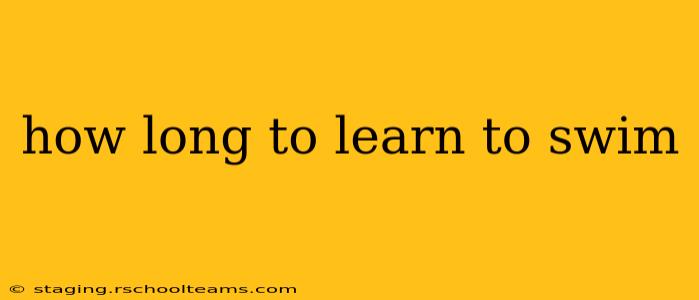How Long Does It Take to Learn to Swim? A Deep Dive into Water Confidence
Learning to swim is a rewarding experience, offering a lifetime of fitness, fun, and safety. But how long does it actually take? The answer isn't a simple number of days or weeks. It depends heavily on several factors, making it a highly individual journey. Let's explore the key elements influencing the learning curve.
What Factors Determine How Long It Takes to Learn to Swim?
Several crucial factors determine the time it takes to learn to swim:
-
Prior experience: Have you ever been in the water before? Even basic familiarity with water can significantly reduce learning time. Those with prior experience in other water sports might find the transition easier.
-
Natural aptitude: Some people naturally pick up swimming techniques faster than others. Body type, coordination, and comfort level in the water all play a role.
-
Frequency and intensity of lessons: Consistent practice is key. Regular lessons with qualified instructors, even short sessions, will yield faster results than infrequent, long sessions. Intense practice can be effective, but it's important to avoid burnout and ensure proper technique is prioritized.
-
Learning style and instructor: Different teaching methods suit different individuals. A good instructor adapts their approach to the learner's style, making the process smoother and more efficient. Individual instruction offers more personalized attention.
-
Goals and definition of "learning to swim": What does "learning to swim" mean to you? Is it being able to float, tread water, swim a few strokes, or complete a full lap? Setting realistic, incremental goals ensures a positive learning experience.
How Long to Learn Basic Swimming Skills?
For most adults learning from scratch, mastering basic water safety skills like floating and treading water can take anywhere from a few weeks to a couple of months with consistent lessons. Children often progress faster due to their natural buoyancy and less fear. This initial phase focuses on building confidence and comfort in the water.
How Long to Become a Competent Swimmer?
Developing competency in various strokes (freestyle, backstroke, breaststroke, butterfly) and swimming longer distances requires significantly more time and dedicated practice. This stage could take several months or even years depending on the factors mentioned above. Regular practice, consistent effort, and focused attention on technique are critical.
How Long to Learn to Swim as an Adult?
Adult learners may face additional challenges due to pre-existing fears or anxieties around water. However, with a patient and supportive instructor, adults can successfully learn to swim. It's crucial to address any anxieties and build confidence gradually. The time it takes can vary greatly but is often comparable to children's learning timelines if they are committed.
Can I Teach Myself to Swim?
While some individuals might develop basic skills independently, it's strongly discouraged to learn to swim without professional guidance. Incorrect techniques can be dangerous and lead to injuries or a fear of the water. A qualified instructor can ensure proper technique and address any safety concerns.
What are the Benefits of Learning to Swim?
Learning to swim offers a wealth of benefits, including:
- Improved fitness: Swimming is a full-body workout, beneficial for cardiovascular health and muscle strength.
- Enhanced safety: Swimming skills are crucial for water safety, reducing the risk of drowning.
- Stress relief: The rhythmic nature of swimming can be calming and stress-relieving.
- Social benefits: Swimming provides opportunities for social interaction and participation in water sports.
In conclusion, the time it takes to learn to swim is highly individual. Setting realistic goals, consistent practice, and professional instruction are key factors that will significantly influence your progress. Focus on enjoying the process and celebrate every milestone along the way!
